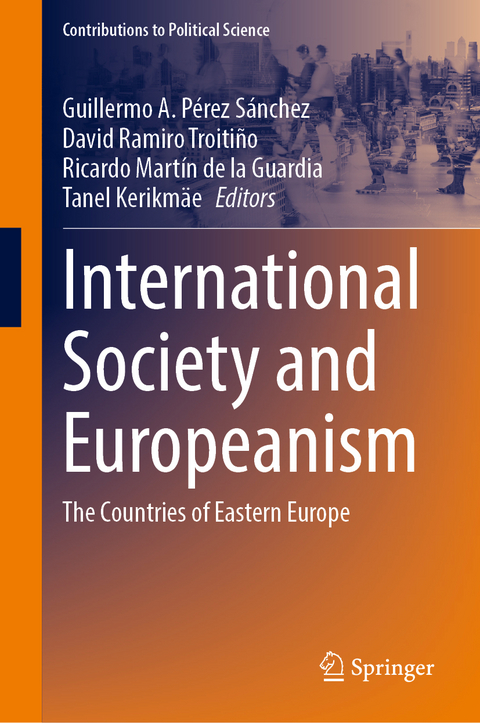
International Society and Europeanism
Springer International Publishing (Verlag)
978-3-031-66076-4 (ISBN)
- Noch nicht erschienen - erscheint am 09.03.2025
- Versandkostenfrei
- Auch auf Rechnung
- Artikel merken
This pioneering volume examines Europeanism in the new international society that emerged after the First World War through the League of Nations, with a focus on the countries of Central and Eastern Europe (CEE), the Baltic countries, and the Balkans. The book analyzes how Europeanism was consolidated as an argument for the future, especially after the Second World War, when the three strong ideas of Europeanism came to fruition: peace among Europeans, good democratic government, and the socioeconomic welfare of peoples. By doing so, this book offers a comprehensive overview of the evolution of Europeanism and its positive influence in the countries of Eastern Europe, from the interwar period to the present day.
The book will appeal to researchers, students, and scholars of political science, international relations, European studies, and history, as well as policy-makers interested in a better understanding of Europeanism and the European integration process of the CEE, Baltic, and Balkan countries.
Guillermo A. Pérez Sánchez is a Professor of Contemporary History at the Department of Modern, Contemporary, American History, Journalism and Audiovisual Communication and Advertising at the University of Valladolid (Spain), and Director of the Institute for European Studies (Jean Monnet Center of Excellence). Previously, he has been a "Salvador de Madariaga Fellow" at the European University Institute of Florence (Italy), where he worked on issues related to European integration. Pérez Sánchez's research focuses on the European ideal, the recent history of the Eastern countries and the former Soviet Union, as well as on relations between the global North and South. He has published various books, book chapters, and journal articles on these topics, including the Springer volumes "The EU in the 21st Century" (2020) and "The European Union and its Political Leaders" (2022) as a co-editor.
David Ramiro Troitiño is a Professor at the Tallinn University of Technology (Estonia) and Jean Monnet Chair on Digital Europe and Future Integration. He is the author of more than 100 publications, including two Springer books related to the topic as an editor: "Brexit: History, Reasoning and Perspectives" (2018), "The EU in the 21st Century: Challenges and Opportunities for the European Integration Process" (2020), and "The European Union and its Political Leaders" (2022). His research focuses on the European Union from a broad perspective, approaching it as a process.
Ricardo Martín de la Guardia is a Professor of Contemporary History at the University of Valladolid (Spain) and a Jean Monnet Professor for the History of the European Union since January 2020. Previously, he was the Director of the Institute of European Studies at the Jean Monnet Center of Excellence, University of Valladolid, between 2009 and 2013. His research focuses on international relations and European integration. Martín de la Guardia is the author, co-author, or editor of various books, journal articles, and book chapters, including the Springer volumes "The EU in the 21st Century" (2020) and "The European Union and its Political Leaders" (2022) as a co-editor.
Chapter 1. Building Europe in a Time of Deconstruction and Destruction.- Chapter 2. The Baltic States and Europeanism in the Interwar Period. The Implementation of a European Model Antagonist to Soviet Structure.- Chapter 3. Exile and Europeanism. Eastern European Exiles During the Years of Real Socialism and Their Influence on the Fall of the Soviet System When the Liberation Revolutions of 1989-1991 Took Place in the Area.- Chapter 4. Central Europe and Europeanism: Divided Germany After World War II, East German Dissidence and Europeanism.- Chapter 5. At the Boundaries of Europe, From the Interwar Period to Post-second World War: Turkey and Europeanism.- Chapter 6. Europe, From the Interwar Period to the Decolonization Process: Anticolonialism and Europeanism?.- Chapter 7. Central Europe and Europeanism: the Case of Czechoslovakia, From the Interwar Period to Its Aspiration for Integration Into the European Community.- Chapter 8. Balkan Europe and Europeanism: the Case of Croatia, From the Interwar Period to Its Aspiration to Join to Community of Europe.- Chapter 9. On the Eastern Border of Europe: the Case of Ukrainian Nationalism, From the Inter-war Period to the Years the Second World War: Towards an Independent Ukraine?.- Chapter 10. The Petite Entente Des Femmes in the Interwar Period and Their Integration Ideas.- Chapter 11. Central Europe and Europeanism: the Case of Hungary, From the Interwar Period to Its Aspiration for Integration Into the European Community.- Chapter 12. Europe's Importance to Poland During the Communist Period.- Chapter 13. From Europeanism to Europeanisation: Electoral Behaviour in the Baltic States and the Visegrad Group (2004-2024).- Chapter 14. Women in Interwar Period and Europeanism in Central Europe.
| Erscheint lt. Verlag | 9.3.2025 |
|---|---|
| Reihe/Serie | Contributions to Political Science |
| Zusatzinfo | Approx. 200 p. |
| Verlagsort | Cham |
| Sprache | englisch |
| Maße | 155 x 235 mm |
| Themenwelt | Sozialwissenschaften ► Politik / Verwaltung ► Vergleichende Politikwissenschaften |
| Schlagworte | Balkan • Baltic Countries • Borders • Central and Eastern Europe • Decolonization • Democracy • Disintegration of the USSR • Economic Development • European Community • European Idea • European Integration • Interwar Period • League of Nations • Nationalism • NATO • Peace • social development • Soviet Union • Transformation • welfare |
| ISBN-10 | 3-031-66076-5 / 3031660765 |
| ISBN-13 | 978-3-031-66076-4 / 9783031660764 |
| Zustand | Neuware |
| Haben Sie eine Frage zum Produkt? |
aus dem Bereich


